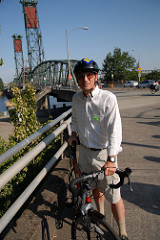The Obama Administration’s Cash for Clunkers program has caused a lot of confusion and a bit of outrage among bicycle and sustainable transportation advocates. For politicians devoted to the environment and sensible transportation choices, it has meant tough decisions.
Started as a way to kickstart the economy and improve the fuel efficiency of the nation’s auto fleet, the program has driven thousands of people to deserted auto dealers. The program has been so popular that it has run out of cash. The U.S. House of Representatives voted to add an additional $2 billion of emergency funding to the program and the Senate is expected to vote on it this week.
“I was uncomfortable that we didn’t tighten the definition enough to make sure… that we were really getting rid of foul clunkers, and we’re replacing them — not with a new Suburban — but with more fuel-efficient vehicles.”
— Congressman Earl Blumenauer on why he voted against a $2 billion bailout of the program
But at what cost (to our transportation goals, public health, economy, etc…) has the program “succeeded”? To many, Cash for Clunkers seems like nothing more than a subsidy for the auto industry and it seems to fly in the face of commitments from the Obama administration to encourage less driving in order to create more livable communities.
With all this swirling around my head, I asked Congressman Earl Blumenauer about the program at a fund raising event I saw him at last night. I asked him to help me understand how lawmakers can justify a commitment to green transportation and livable communities while handing out checks for people to buy new cars. Here’s how he responded:
“I think the principle has great merit. We have stuff on the road that shouldn’t be there; it’s polluting, it’s dangerous. I mean, you look at the profile of some of these things that are driving around now — they’re more likely to be involved in accidents, they’re more likely to be abandoned and we have to somehow get them out of the neighborhoods.
Cash for clunkers is something I think should be part of an overall strategy.
I was uncomfortable that we didn’t tighten the definition enough to make sure that we have the delta [the gap between what’s considered a clunker and what someone can purchase], that we were really getting rid of foul clunkers, and we’re replacing them — not with a new Suburban — but with more fuel-efficient vehicles.
I actually voted against it [the $2 billion bailout] — and I’m sure it gave some of my auto dealer friends heartburn — because I didn’t feel comfortable with tripling the size of the project that was supposed to last until the end of the year that may not last two weeks, and to make sure it isn’t just throwing money at an expensive rebate.
Yes it helps the economy, yes it helps the upper Midwest, but I’d like us to be more careful.
I think the message has been delivered. The administration was in a tough spot because it got launched and it may run out of money, leaving the dealers in a lurch and they didn’t want to do that…
Some of us are sympathetic to the goal, but we would like to see it institutionalized as part of a strategy that actually does get rid of clunkers and replaces them with cars from the future and we scale it back to where it should be so the program can be sustainable.”
Unless the specifics of this program fundamentally change (and the Senate isn’t voting on new amendments, only on the already-passed House extension), it seems the debate will rage forever. The optimist in me sees this as an example of the saying, “Don’t let the perfect be the enemy of the good,” but the pessimist in me sees this as nothing more than another example of automobile culture and messy politics run amok.
As for Blumenauer, he seems to have bigger fish to fry in his quest to build relationships on both sides of the aisle in order to make sure bicycles are a larger part of the transportation status quo.


